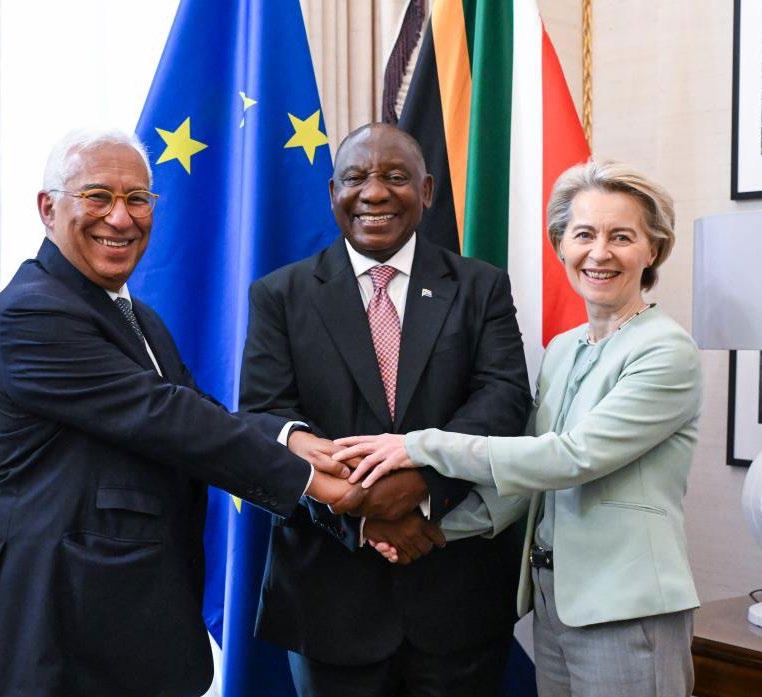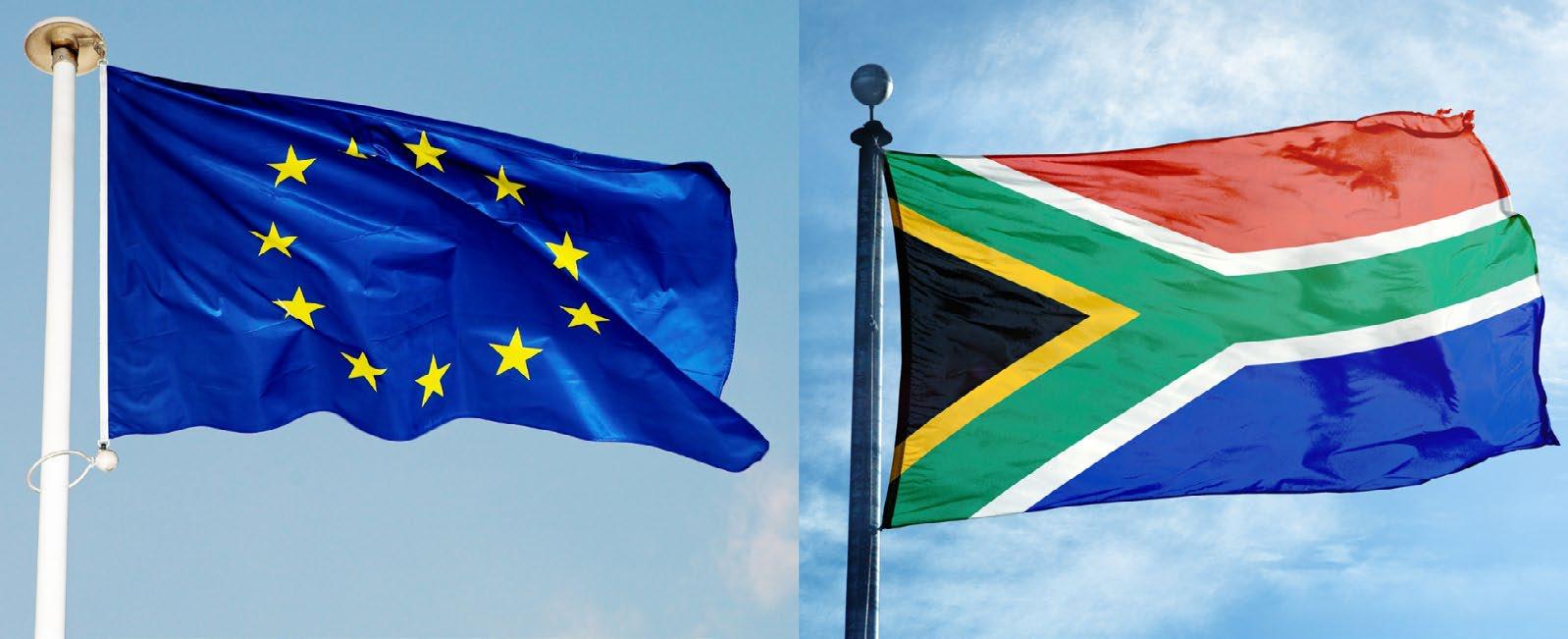
8 minute read
The 8th EU-South Africa Summit
Strengthening Partnership, Boosting Trade and Investments
By Shumirai Chimombe
The 8th summit between the leaders of the EU and South Africa took place in Cape Town on 13 March.
The President of the European Council, António Costa, together with European Commission President Ursula von der Leyen, represented the EU while South Africa was represented by President Cyril Ramaphosa.
According to the Delegation of the European Union to the Republic of South Africa, the summit was an opportunity to reaffirm Europe’s commitment to its unique partnership with South Africa, strengthen strategic ties, and tackle global challenges together. It was also a key moment to support South Africa’s G20 presidency and prepare for the EU-African Union Summit later this year.
In his opening remarks, Mr Costa indicated that the summit was of great importance against the backdrop of an uncertain world where multilateral commitments are being tested, and the rulesbased international order faces growing challenges. This while new technologies disrupt political systems and global power dynamics,
“The European Union and South Africa are not just partners, we are strategic allies, bound by shared values of democracy, human rights, rule of law, and multilateralism. Our partnership delivers real benefits to our citizens, our economies, and the world.
We are united in our commitment to peace, security, and sustainable development. We stand together to help uphold the United Nations Charter, advance the sustainable development goals, and drive towards global action on climate change, poverty reduction, and economic reform.”
Launching The Clean Trade Investment Partnership
During the Summit, Europe and South Africa agreed to begin talks on a new generation of trade deals - a Clean Trade and Investment Partnership.
South Africa will be the first country to sign such an agreement with the EU. It will focus on investment, the clean energy transition, skills, and technology, and on developing strategic industries along the entire supply chains – thus creating good jobs in Africa. The leaders also agreed to extend their cooperation to critical raw materials.
To launch this partnership, President von der Leyen announced an EU Global Gateway Investment Package with South Africa worth €4.7 billion to boost mutually beneficial investments. This package will include grants and loans from European financial institutions and businesses.
The biggest bulk of the package – €4.4 billion – will be invested in projects supporting a clean and just energy transition in the country, according to the European Commission.
The investment package is anchored in three building blocks which are to support the just energy transition; to strengthen connectivity infrastructure and to reinforce South Africa’s vaccine production capacity.
In addition, the package will provide resources for capacity building, skills development, cooperation on research and development and sustainability standards.
Looking To The Future
In his State of the Nation newsletter on 17 March, H.E. Cyril Ramaphosa wrote that this summit will be remembered as a watershed moment in the development of our trade and investment relations. While expanding our traditional areas of cooperation, we are now focused on working together to develop the industries of the future.
He indicated that the Clean Trade and Investment Partnership will support the development of value chains that are more environmentally sustainable. It will make South Africa and the EU more competitive in a low-carbon global economy by improving conditions for investment in the extraction and local benefication of rare minerals, renewable energy, low carbon hydrogen and clean technology. It will also improve cooperation between South Africa and the EU on some of the regulatory issues that constrain greater levels of trade. This would result in South African companies being able to export products like sustainable fuel and electric and hybrid vehicles to the EU.
“We will work with our EU partners to develop the industries that process our natural resources into finished goods for export. This creates more jobs here in South Africa and ensures that our country derives a greater benefit from our natural resources. We agreed on further cooperation in the areas of education, science, technology and innovation, specifically providing opportunities for young people to acquire skills through greater investment in education and science.”
His Excellency wrote that as a bloc, the EU is one of South Africa’s largest trading partners and the source of much investment in the country. He said that the country’s economic ties with European countries go back to colonial times. Since the advent of democracy 30 years ago, we have steadily been growing the volume and value of trade.
He concluded that the summit confirmed the great alignment between South Africa and the EU on matters of global and continental significance.
“We share a vision of a just, peaceful and more equal world order in which all countries are able to develop and thrive. We have a shared vision of the future and we are determined to work together to achieve it.”
EU - South Africa Summit Declaration
At the end of the Summit, the leaders signed a joint declaration. Some of the important points in the declaration include:
Multilateral Cooperation
“We expressed our unwavering belief and commitment to multilateralism, a consistent approach to the rules-based order, and the centrality of the United Nations Charter.”
“In the face of this challenging political and socio-economic environment, we underscored our belief in the principle of multilateral cooperation to collectively address shared challenges.”
On The G20
“The European Union expressed support for South Africa’s G20 Presidency in 2025, the first on African soil, including its theme of Solidarity, Equality and Sustainable Development. We reaffirmed the importance of the G20 as the main global forum for international economic cooperation. The European Union will support the G20 partnership with African economies that South Africa is forging, including through strengthening the G20 Compact with Africa, and expanding its membership.”
Support For Multilateral Institutions
“We stress the importance of a transparent rules-based multilateral trading system that is non-discriminatory, fair, open, inclusive, equitable, and sustainable, as a necessity to promote economic growth, development, and poverty reduction.”
On Technology and AI
“We recognised the impact of rapid technological change from emerging technologies such as Artificial Intelligence (AI), which presents both opportunities and threats. We agreed to work together to promote international cooperation, including under the auspices of the United Nations, for an international governance framework for AI. In line with our shared commitment to the Global Digital Compact, we agreed to support developing countries to close the digital gap, and equitably share its benefits, and mitigate risks, including those related to data protection, intellectual property, privacy, and security.”
On Regional Cooperation
“We recalled that 2025 marks the 25th anniversary of the European Union - African Union partnership and underscored the importance of holding the 3rd EU-AU Ministerial Meeting and the 7th EU-AU Summit in 2025.”
On Bilateral Sectorial Cooperation
“We noted with appreciation the continued expansion of our bilateral cooperation across a diverse range of sectors, with regular policy dialogues covering the areas of trade and investment; macro-economic policies; scientific research and innovation; environment, climate and water; energy; human rights; and politics, defence, peace and security.”
“We agreed to continue to collaborate on health-related matters, with a focus on pharmaceuticals and vaccines. We underlined our joint commitment to the African Union goal to produce in Africa over 60% of the vaccines needed for Africa’s population.”
“We acknowledged that South Africa remains the European Union’s key trade partner in SubSaharan Africa, and that the EU is the leading foreign investor in South Africa.”
On Growth and Development
“We recognised the need to harness critical minerals for inclusive growth and sustainable development and support the development of a framework towards clean industrialisation and investments to ensure progress towards an agreement that promotes value addition and benefication of critical minerals close to the source of extraction.”
On Visa Policy
We decided to continue our ongoing dialogue on visa policy between South Africa and EU Member States with a view to fostering people-to-people contacts and facilitating enhanced interactions for investors and businesses.
Towards The Future
“The EU extended its gratitude to the Government of South Africa for successfully hosting the 8th EU-South Africa Summit in Cape Town. We look forward to a continued strong bilateral cooperation, including in the framework of the G20 Summit hosted by South Africa in November.”
“We, the Leaders of South Africa and the European Union, agreed to reconvene in the margins of the G20 Leaders’ Summit to ensure steady progress on the commitments made at today’s Summit.”
Extract from 8th EUSouth Africa Summit Declaration - 13 March 2025

Sources: Delegation of the European Union to the Republic of South Africa | European Commission | South African Government | Department of International Relations & Cooperation (DIRCO)










